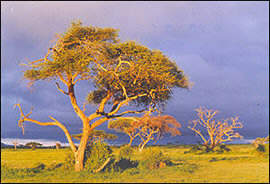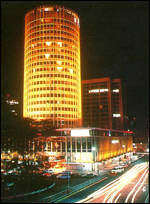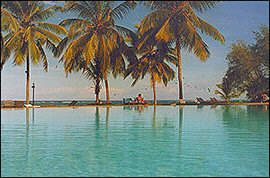 TOURISM: AGAINST ALL ODDS TOURISM: AGAINST ALL ODDS |
Air Kenya has barely been affected by the slump in the tourism market. The safari market traffic steadily grew at a pace of 10-15%. Other companies have not fended that well, though. There are several reasons to expain the recession the sector has been going through. The fist one were the civil disturbances that took place at the Coast during the 1997 elections. Even though these were quite serious at the time, they did not directly affect tourists, but international media blew the news out of proportion. International tour operators did not want to take any risks, consequently European and American customers were deviated to safer destinations. The El Niño rains occurred the same year further affecting the "sun-and-beach" tourism at the Coast. The bombing of the American Embassy in August 1998 only made things worse in terms of perceived risks. Increasing competition from other countries in the region (Tanzania, Uganda, etc), insecurity issues and the obsolescence of some of the resorts that have not kept up with the times are other underlying reasons for the slump of the sector.
The combination of all these factors made the number of visitors and the length of their stay drop 10.6% and 18.6% respectively in 1998. In 1997 over 1 million visitors entered the country whereas in 1998 that figure dropped to 894.300. This decrease in the number of tourists worried the sector and the government, since tourism accounts for 20% of Kenya's GD, it represents 18% of foreign exchange earnings, and provides 11% of government levies. Given its importance and its dismal performance, it prompted the sector to get their act together. Both the private and public sector got together in order to revamp the image of Kenya as a tourist destination.
 KENYA: THE GARDEN OF EDEN KENYA: THE GARDEN OF EDEN |

Kenya is one of the most hauntingly beautiful countries in the world. It has been blessed with a large variety of landscapes: wild savanna in the West and South, deserts in the North, rain forests in central Kenya, beaches by the Indian Ocean... The name of some of its places are as suggestive as Lake Victoria, Mombasa, Nairobi, Masai Mara, Amboseli, Kilimanjaro... Royalty, aristocrats, presidents, movie stars, models, artists, writers have lived or visited this pearl of Africa leaving their imprint or their works to posterity.
Kenya is mostly known for its vast and divers animal life. The dwindling population of elephants, leopard, lions or rhinos, to name but a few of the endangered species, has found refuge in Kenya National Parks, even though they can be spotted all over the country. Kenya Wildlife Services (KWS) was founded in 1990 to protect Kenya's most valued treasure. Former head of KWS, Dr. Leaky (today Head of Kenya's Civil Service), did an excellent job stopping poachers from finishing up Kenya´s wildlife. Even though he carried out some controversial policies such as allowing to shoot poachers at sight, or surrounding game parks containing endangered species with electric fences (e.g. Nakuru National Park). The results are there to be seen. After the 1970's terrifying slaughter of 60% of the elephant population (104,000 elephants were killed), President Moi public buring of 60 tons of elephant tusks recovered mainly from poachers, underlined Kenya position regarding the illegal international trade of ivory and rhino horns. The number of elephants has slowly started to increase, and the rhino population, by far the most endangered of the species, have also raised. 10% of the surface of the country has been reserved for wildlife. Today there are 59 declared Game or Marine National Parks. These credentials should suffice to attract tourists. However the industry failed to do any major effort to promote the country until hotel occupancy levels came down to 35.3% in 1998 and tourism earnings fell from Ksh 22,640 million (US$ 301 mill) in 1997 to Ksh 17,500 million (US$ 233 mill) in 1998. Promoting the country became a question of "do or die".
 KENYA TOURIST BOARD IS SETTING THINGS IN ORDER KENYA TOURIST BOARD IS SETTING THINGS IN ORDER |
In 1997 the Kenya Tourist Board (KTB) was created to coordinate the activities of the tourist business community bringing in together the private sector and the government. Even though they are under the umbrella of the Ministry of Tourism, Trade and Industry, they are private sector driven. "Its main purpose is to promote Kenya in the international market as a tourist destination", explained Mr. Eliud Mahihu, ex-chairman of the KTB. Unfortunately his words did not match his actions. He was sacked without previous notice in August 1999, and substituted by the much younger Mr.Uhuru Kenyatta, son of the former president of Kenya, Jommo Kenyatta. Mr. Kenyatta wants to bring a younger outlook and a new perspective more in tune with the sector, synchronizing the efforts of its major players (Hotel Keepers Association, Kenya Association of Tour Operators, Kenya Tourism Federation, Ministry of Tourism, etc.) and unifying their marketing policy. He believes they have to maintain and consolidate the existing market rather than focusing on new fronts or marketing initiatives, "I do not believe you have to look for new markets if you are loosing out on what you already have" argues Mr. Kenyatta.
For many years Kenya was the tourist destination in Africa. It was the only stable and peaceful country in the sea of conflicts of its neighbors. It was the only choice. With little or no effort they got the business. They took business for granted and they started lagging behind instead of keeping pace with the times. What happened next was that new players offering a similar product made that extra effort, i.e. South Africa, Tanzania Botswana, Zimbabwe or Uganda, increasing competition for the same tourist bracket as Kenya. "There is a need to take a more pro-active approach as opposed to the laid-back one of it will come. We will now have to start portraying Kenya not as the only place, but as one of many. When there are options you have to shout your name louder than your competitor " he remarks. Although according to the former Minister of Tourism, Mr. Henry Kosgey (present Minister for Science and Technology), the approach is to have the Easter African regioncooperate, to market the whole region collectively.
 EXTRA-SECURITY IN THE GAME PARKS AND IN THE COAST EXTRA-SECURITY IN THE GAME PARKS AND IN THE COAST |
The government has definitely started making some
efforts not only to attract more tourists to the
country, but to increase their satisfaction. For
instance, security in game parks and in the coast
has been heavily stressed. Rangers have been provided
with weapons and motor vehicles and, seen the results,
they have been very successful at protecting tourists.
In August 1999 a group of American tourists visiting
the Masai Mara Reserve were stopped by bandits at
gun point and robbed of their money and valuables,
including their cameras loaded with photo-shots
of wild life to boast about back home. In less than
24 hours the thieves were apprehended and their
possessions restored to the tourists. Our team met
some of these travelers who were deeply thankful
to the speed the government had reacted and the
way the sector and the Administration and behaved
towards them. In order to compensate them for the
inconveniences, they were upgraded, accommodated
into 5 star hotels such as the Hilton
Nairobi. |
 IT HAPPENS AT THE HILTON IT HAPPENS AT THE HILTON |

The Hilton Nairobi was one of the fist major international hotels to operate in Kenya. It celebrated its 30th anniversary in 1999. Despite the slump of the sector, the Hilton has not stopped moving. For 3 years up to 1998, Hilton premises underwent major renovations worth US$ 12 million in order to maintain a competitive edge on an ever-increasing competitive market. The refurbishment and improvement of guestrooms, banqueting halls and public areas has set the pace to other renowned hotels such as the historical Landmark, or the Intercontinental. The Nairobi Hilton has managed to cater both for tourists and businessmen. During the slow down of the tourism sector they have been able to maintain pretty high occupancy rates thanks to business travelers. Its unparalleled location in the center of Nairobi business district sets them apart from the rest. During the COMESA Summit, President Kabila of the Democratic Republic of Congo, chose to stay at the Hilton due to its unbeatable location and its state of the art security measures. Mr. Pitman, ex-manager of the Hilton Nairobi, claims that their mission is "to ensure our guests experienced service and quality standards at the level they appreciate back in the US". The main reason Mr. Pitman can say this because of the on-going training of personnel, asked to perform at international levels.
Being Kenya Safari country, the Hilton also offers its guests the chance to experience the wild life and wide savanna plains. Hilton operates three lodges: Hilton Taita Hills Safari Lodge, Hilton Salt Lick Safari Lodge and Hilton Safari Camp in Tsavo, located in the 28,000 acre Taita Hills Wildlife Sactuary. There guests have the opportunity to view wild animals in their natural habitat, while combining adventure with leisure at the 9 golf course.
 FRESH MONEY INVESTED IN THE HOTEL INDUSTRY FRESH MONEY INVESTED IN THE HOTEL INDUSTRY |

Kenya has been for long considered an exclusive tourist destination. Probably for this reason Sheraton Hotels have decided to sign an partnership agreement in June 1999 with Block Hotels taking over their management,. Block hotels counts with some of the oldest institutions in the market, such as Treetops, where Queen Elisabeth of England received the news that his father King George VI had died, being thus proclaimed queen in Kenya. Many of these hotels and lodges, some of them up to 70 years old, need urgent renovation and upgrading. For that reason a multimillion dollar renovation program will be launched shortly.
A local hotel chain quite popular in Kenya is the Serena Hotels, directed by Mahmud Jan Mohamed. Even though they are local, their standards are very high, especially in service, banqueting, decoration and landscaping. Their rooms are nicely furbished, although quite small. Its main shareholders are the Aga Khan Fund for Economic Development (AKFED), the International Finance Corporation and the Kenyan Government, which in 1996 sold 23% of the shares it owned. Serena reputation is such that when this package was floated in the NSE, it was over-subscribed by 400%. Nowadays Serena counts with 6 high standing hotels and lodges in Kenya and 5 in Tanzania. Again, keeping in tune with the rest of Kenyan businessmen, they rather see themselves as an Eastern African Company. In fact they do not see themselves as a hotel chain, but rather as a 'collection of properties', each one being unique in its concept.
 THE CARNIVORE: NOT APT FOR VEGETARIANS THE CARNIVORE: NOT APT FOR VEGETARIANS |
When talking about uniqueness the Tamarind Group tops them all. This Restaurant and Entertainment chain started in 1972 as a small restaurant in Mombasa specializing in seafood. Over the years it has expanded to a series of restaurants, villas and a casino. The jewel of the group is The Carnivore, a mixture of restaurant, night club and amusement center. What characterizes this place is the food served there: zebra, gazelle, giraffe, crocodile, and all kinds of wild game meat. It became a roaring success ever since its inception in 1980, staying the top favorite restaurant for locals and tourists. In fact, a group of South Africans were so impressed by it that they went into partnership with the Tamarind Group to open up a similar restaurant in Johannesburg.
Numbers are quite stunning. The group recorded US$ 11.5 turnover in just in the restaurant businesses. The Carnivore alone was responsible for a US$ 8 million turnover, it has 9 managers, 330 staff, and they cook 30-40 tons of meat a month for an average of 1000 guests per day. Mr. Martin Dunford, Managing Director of the group (when he is not following his passion, surfing,) specifies that there are no wild animals killed to be eaten in their restaurants (big game hunting is illegal in Kenya), they are all farm reared. Mr. Dunford believes that "the future of Africa's herd is that they become of some economic value. One way to do it is to game-ranch them, adding some economic value to the animals. That way, people will protect them in the future".
The Tamarind also counts with The Tamarind Village, a Swahili style villas complex overlooking the sea and the old city of Mombasa. This multi-property apartment complex has some of the largest and best decorated hotel rooms in the coast and it is situated at walking distance of one the best sea-food restaurant in the country: The Tamarind, a must for sea-food lovers. Make sure to call and make a reservation before coming here. As the most popular restaurant in Mombasa, it is usually fully booked. |

